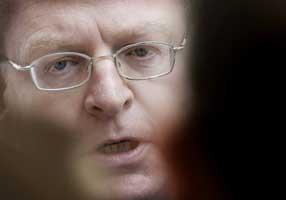Better scrutiny of the rich set would be good for us all

Compared with the knowledge and scrutiny of people living in poverty in Ireland, little is known about how wealth is generated, by whom, and what they do with it. By Siobhán O'Donoghue.
The number of Ireland’s rich, measured as those having investable assets of $1 million or more, rose by over 10% last year. To top it off ‘Ireland is perceived to be ahead of the game’, because apparently, our efforts to rein in the public finances have paid off for the Irish economy. This is according to Nick Tucker, Market Leader UK and Ireland for Merrill Lynch Wealth Management on the release of 14th Annual World Wealth Report by Merrill Lynch Global Wealth Management and Capgemini. The rise in the number of people on the ‘rich list’ is largely attributed to a stock market recovery.
(Pictured: Former Minister for Justice Michael McDowell who in 2004 controversially said that inequality'provides incentives')
This is the same Ireland that has the largest deficit in the EU; with 25% of the population at risk of poverty; where there has been an increase by 13% of people in mortgage arrears; where half the people sent to prison last year were put there for non payment of fines; where at least €32 billion, the equivalent of one year’s tax receipts, is been handed over to Irish financial institutions.
Reigning in the public finances is code for cuts to social welfare that have forced already impoverished families into destitution; cuts to vital services that have left children without essential learning supports; cuts to community groups who provide the vital glue that hold struggling communities together; closure of libraries, swimming pools and hospital beds, cuts to dental services, home help and community care services and much more.
There is now a comprehensive body of research to show that income inequality is not only a problem for people on low incomes but has a damaging impact on all of society. Health both physical and mental, public and personal safety, community cohesion are all adversely effected when there is an unacceptable gap between the super rich and those on low incomes.
Michael McDowell, a former Minister for Justice caused a stir in 2004 when he publically stated that ‘a dynamic liberal economy like ours demands flexibility and inequality in some respects to function.’ It ‘provides incentives’ he said. Mr McDowell was correct. High speed crony capitalism does indeed depend on the existence of inequality to function as we have found to our detriment.
Ordinary people in order to maintain rising living standards became increasingly indebted aided by banks, who threw money at people irrespective of wither they had the means to repay it or not. The majority of ordinary people, rather than living exorbitant lifestyles, were in fact running faster and harder simply to keep up. The debt to disposable income ratio of Irish citizens rose by 270% over the period between 1995 and 2008.
The concentration of wealth and financial capital amongst an elite group of people, often operating transnationally, helped to transfer power and wealth into the hands of individuals and companies. It is increasingly clear that this overly privileged section of society have been able to operate with minimal or no transparency and accountability with detrimental consequences.
These elite groups have been able to assert extraordinary pressure and influence on governments, media and public discourse. The direction of this influence has been to amongst other things, to weaken regulation, lower taxes and successfully advocate for the introduction of a plethora of tax exemptions and tax avoidance measures benefiting only the most well off in society.
In addition events of the two past year has brought into sharp focus just how incapable or unwilling government have been to govern and control the financial, banking, property and development sectors. "The Honohan report, the various tribunal reports, the sidelining of development plans, the reluctance to progress legislation such as the Employment Law Compliance Bill provide enough evidence to show that the government has taken a laissez-faire approach to regulation, governance and enforcement.
The net effect of this approach has been to create the conditions for massive generation and transfer of wealth concentrated amongst a very small group of people i.e. the top 1% own 20% of the wealth generated over the Celtic tiger years. We now know that a lot of this wealth was not put to productive use and in effect has not provided a benefit for society.
Alongside the growth of an unaccountable global financial elite, the destructive behaviour of significant business interests and the damaging fiscal policies of our government, a general attitude of ‘you earn what you deserve and deserve what you earn’ has permeated our public discourse. This has reinforced the age old myth of social mobility with the resulting consequence that welfare dependent individuals and low income earners being effectively blamed for their own unequal status in society. This ingrained acceptance of income inequality is now reinforcing arguments for cuts to social welfare and the minimum wage.
There is a considerable amount of knowledge and scrutiny of poverty and people living in poverty in Ireland. This stands in stark comparison to the dearth of information on those at the other end of the scale. Little is known about how wealth is generated, who exactly holds it and what they do with it. Our own government does not know who exactly benefits from all the tax expenditures in place, how they are used and what purpose they serve.
There is a strong case for much more scrutiny and monitoring of those who hold the most wealth. After all the exclusive status and behaviour of the most privileged and powerful wealth holders sets them apart from the majority of society. They are neither accessible not would it appear accountable. This cannot be good for overall societal cohesion and inclusion and is this not a stated government priority.
